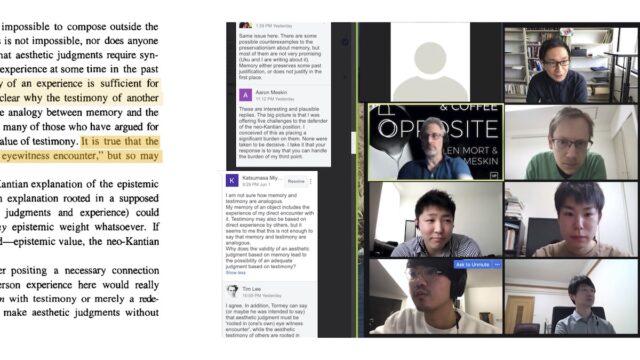Profile

- Research Subject
My main research areas are philosophy of mind, philosophy of psychology, and philosophy of psychiatry. I have been working on the philosophical issues about rationality and irrationality.
- Research Fields
- Philosophy of Mind, Philosophy of Psychology, Philosophy of Psychiatry, Aesthetics, Epistemology, Early Modern Philosophy
- Faculty - Division / Research Group / Laboratory
- Division of Humanities / Research Group of Philosophy and Religious Studies / Laboratory of Philosophy and Ethics
- Graduate School - Division / Department / Laboratory
- Division of Humanities / Department of Philosophy and Religious Studies / Laboratory of Philosophy and Ethics
- School - Course / Laboratory
- Division of Humanities and Human Sciences / Course of Philosophy and Cultural Studies / Laboratory of Philosophy and Ethics
- Contact
Email: miyazono(at)let.hokudai.ac.jp
Replace “(at)” with “@” when sending email.Foreign exchange students who want to be research students (including Japanese residents) should apply for the designated period in accordance with the “Research Student Application Guidelines”. Even if you send an email directly to the staff, there is no reply.- Related Links
Lab.letters


Normal and abnormal
An approach from the irrationality of the mind
Can we draw a sharp and precise line between “normal” and “abnormal”? On the one hand, delusional beliefs such as paranoia delusion (e.g. “My co-workers are trying to prevent me from being promoted.”) or grandiose delusion (e.g. “God gave me the special capacity for predicting future events.”) are often regarded as “abnormal” by clinicians. On the other hand, conspiracy theories (e.g. “World Trade Center was destroyed in a controlled demolition.”) or vaccination skepticism (e.g. “MMR vaccine causes autism.”) are typically not regarded as “abnormal”. But what is the difference between “normal” beliefs and “abnormal” beliefs, exactly? Can we really distinguish “normal” beliefs from “abnormal” beliefs? This and other related issues are discussed in Philosophy of Psychology: An Introduction (K. Miyazono & L. Bortolotti 2021, Polity Press). I hope that this textbook is read by many students and adopted in lectures and seminars around the world.
The prevalence of the online environment
facilitates more active interdisciplinary collaborative research
I study mind, cognition, and consciousness from a philosophical point of view. These topics are not only for philosophers but also for researchers in a variety of disciplines. Delusion, for example, is an interdisciplinary research topic that has been discussed by psychiatrists, psychologists, philosophers, among others. It is not easy to predict how researchers from other areas respond to my philosophical ideas, which makes interdisciplinary dialogues hard and inspiring at the same time. In recent years, many academic activities including conferences, workshops, research collaborations, are held online, and this trend will continue even after COVID-19 pandemic. I frequently attend online conferences and workshops in different countries and collaborate online with researchers all around the world. Hokkaido University students can do the same, and I strongly encourage them to do so.
Message
My approach to philosophy of mind is slightly different from mainstream philosophy of mind, where the central issues have been the mind-body problem, consciousness, intentionality, etc. Traditional philosophical discussions of mind tend to presuppose rational and normal mind. Irrationality and abnormality have been treated as minor topics in the philosophical tradition (although there are several exceptions, such as the discussion of akrasia among ancient Greek philosophers, or the discussion of passions among early modern philosophers). In contrast, irrational and abnormality play the central role in my research, which is motivated by my belief that a deep understanding of irrationality brings a deep understanding of rationality, and a deep understanding of abnormality brings a deep understanding of normality. My research goes beyond the boundary of philosophy in a narrow sense; it adopts an interdisciplinary approach, which refers to, and learn from, cognitive psychology, social psychology, developmental psychology, neuroscience, psychiatry, behavioral economics and others related fields.




